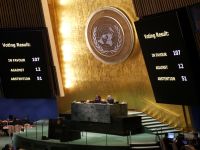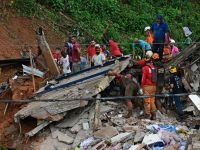A new center for forensic science and rehabilitation will open at the JusticePalace in Tripoli within two months to collect evidence of prison torture and help victims heal. The initiative is especially pertinent in light of the Roumieh Prison videos that leaked last week showing guards brutally assaulting prisoners.
The center, managed by theRestart Center for Rehabilitation of Victims of Violence and Torture, a Lebanese NGO, is supposed to meet with every new detainee in Tripoli.
With consent from prisoners, lawyers, doctors and psychologists will collect forensic evidence of torture and offer physical and psychological care.
Under Lebanese law, security forces can detain a person for a maximum of 48 hours before charging them, releasing them or obtaining a court order to extend their detention. It is during this period that detainees are at the greatest risk of torture before they appear in court.
But according to Suzanne Jabbour, the executive director of Restart, after the initial detention all Tripoli detainees should pass to the judiciary, at the Justice Palace, where they will be visited by lawyers, forensic experts, psychologists and doctors from the forensic center.
“If guards haven’t used a sophisticated approach of torture, we will still be able to detect signs,” said Jabbour, who is also the vice president of the United nations Subcommittee on the Prevention of Torture. According to Restart, fewer than 50 detainees usually pass through the Justice Palace per day, and the center will be able to process all who consent.
Detainees who wish to charge their captors with torture can present the collected evidence to court. “Restart provides a lawyer to support a case,” Jabbour said. “But, you know, people are afraid – there is no mechanism to protect prisoners [from retaliation]. So we study to minimize the risk of reprisal.”
But examiners must know how to detect hidden evidence of torture, said Denise Abboud, a sworn forensic expert for Lebanese tribunals.
“Torturers may employ methods that do not leave physical evidence,” added Abboud, who is a member of the American Academy of Forensic Sciences. “And torture is not only physical but also psychological. Sometimes psychological torture is irreversible and causes bigger damage to the person than physical torture.”
So the experts at the forensic center will have to collect evidence carefully, and Jabbour said they will follow the Istanbul Protocol.
“[The Istanbul Protocol] was created to investigate and document torture,” Abboud said. “Its purpose is to shed light on a dark practice.” It is adopted by the United Nations.
The protocol stipulates the qualifications to admit physical and psychological evidence to court. It also grants detainees the right to request a second medical opinion, and it requires that any medical examiner collecting evidence “be competent and independent of the detaining authority,” Abboud said.
“This examination must be taken seriously and implemented by highly trained medical examiners and personnel to reflect a successful investigation procedure,” Abboud added.
Fahd Muqaddem, president of the North Lebanon Bar Association, praised the center. “It’s the first of its kind,” he said. “Now we’ll be able to meet with the detainees after their initial interrogations. We can prove they’ve been beaten, and we will be able to pursue the perpetrators.”
But unscrupulous jailers may still undermine the center’s goal. It is all too common for security forces in Lebanon to detain suspects far beyond 48 hours, and without allowing any visitors. Muqaddem said this is another obstacle to overcome.
“If I’ve been tortured but kept for 10 days, the evidence will have disappeared,” Muqaddem said.
“Detention cannot exceed 48 hours. Does the crime require more investigation? Then let the judiciary oversee it, not the corporal.”
Muqaddem added that detainees are also entitled, during their initial detentions, to reach a lawyer and see a doctor. “If we implement this form of judicial oversight, then this will go a long way to diminishing torture.”
Ultimately, though, it is up to judges to convict security officers of torture – the forensic center can only provide evidence and legal support. “[Forensic work] will deter violence against prisoners if and only if action is taken against identified torturers,” Abboud said.
But Restart believes the center’s forensic work won’t go to waste, even if detainees cannot secure convictions against torture.
“From the information we gather from prisoners – where they are arrested, if they are really facing abuse – we can map which [detention centers] torture the most,” Jabbour said. “And that is all general information, without naming people.”
The judiciary can then investigate those centers, if it shows the will.
By Philip Issa








